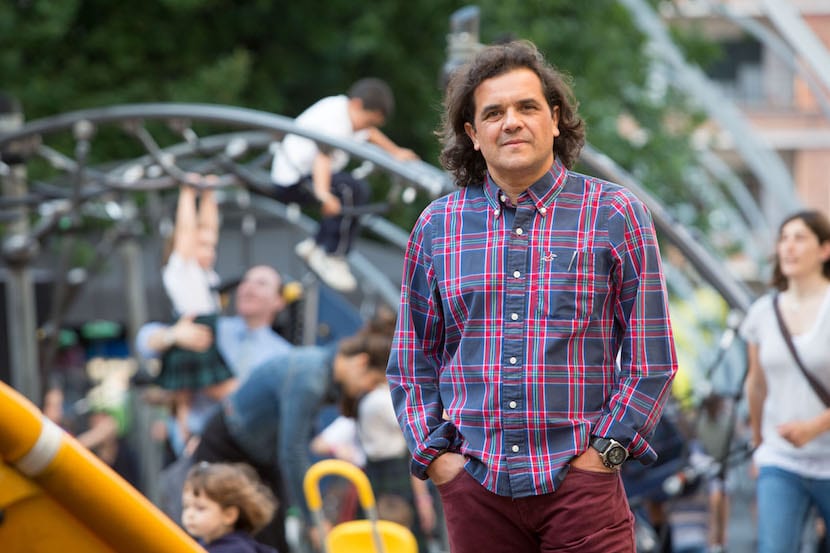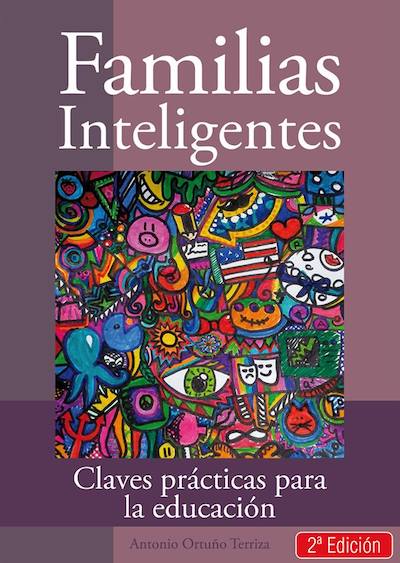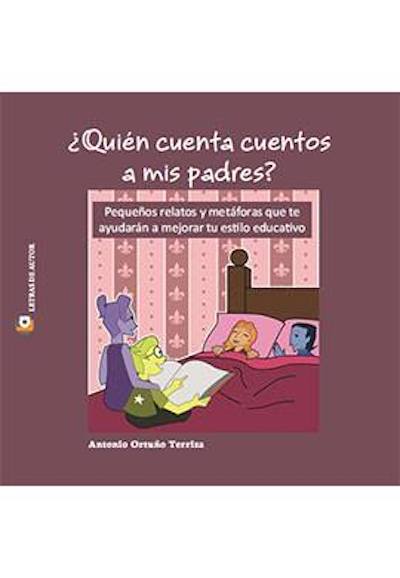
I had this interview pending for a long time: I present to you Antonio Ortuño, Specialist Psychologist in Clinical Psychology and Family Therapist. Some of you may know the Intelligent Families project, including some of its books (“Intelligent Families (practical keys to education)” and “Who tells stories to my parents”?). I met him personally a few months ago in a course I was attending as a student, and I liked his approach, especially because it is far from placing minors as "problems" when conflicts arise, and leave the responsibility to THE WHOLE family.
Antonio has been working with problems associated with childhood and adolescence for more than 25 years, and advising families so that they are able to exercise their parental functions in a respectful and positive way. The Intelligent Families psychology and counseling center offers therapy and training; and training is an activity to which our protagonist spends a lot of time, collaborating with associations and groups (families or professionals). And I do not want to extend the introduction any longer, so I leave you with the interview.
Madres Hoy: What is an intelligent family for you?
Antonio Ortuno: If we start from the definition of intelligence, such as the ability to use the processed information appropriately to solve a certain situation and to be able to adapt to the changes that will inevitably occur, we see that in the field of education of our sons and daughters we have to be smart. There are continually changes, you have to make decisions, solve situations.
In short, educating is providing our sons and daughters with tools so that they know how to resolve present and future situations, accept the changes that are going to take place in their lives, and learn to adapt to the heterogeneous realities that they are going to encounter. An intelligent family looks for this.
MH: What ingredients does parenting and education need for children to be responsible people to themselves and to others?
AO: There are two fundamental ingredients that must be present in any educational recipe: unconditional acceptance and respectful control.
Feeling accepted is key to advance, grow, mature, to feel emotional security. Our sons and daughters need to know with absolute certainty that their parents love and approve of them, regardless of their behavior, their successes, their failures. They must be convinced that there is nothing in the world that can cause them to stop loving them, taking care of them, to be interested, to support them. You must think at all times, "as long as I'm with my parents, nothing will happen to me."
And respectful control consists of setting limits on education, respecting its evolutionary rhythms, regulating the satisfaction of their needs for the progressive construction of their autonomy, and establishing the rules of the game of coexistence. No need to punish, threaten, yell.
MH: I believe that mothers and fathers do not have enough support in such an important task, let us learn from our mistakes. Where are we getting it wrong?
AO: Being perfect mothers and fathers is an absurd purpose that only generates helplessness and overwhelm. Errors, because we all make. One of them is not sharing responsibilitiesIn other words, we put the education of our sons and daughters behind us, seeking self-sufficiency, and not the support of other educational agents. Another very common mistake that I find in my therapies is that we constantly lie to our sons and daughters. Without any ill intention, we say one thing and do another. For example, I say NO, but I do YES.
Adult incoherence hurts minors a lot. Another mistake, seeking obedience and not responsibility. The idea is not not to make mistakes, but to make as few mistakes as possible and learn from it.
MH: Can you explain to us how the 'smart traffic light' works?
AO: The smart traffic light reflects in its three colors the three parenting skills that I believe are vital to exercise good educational practices. Namely, SAY NO (red traffic light), NEGOTIATE (yellow traffic light) and TRUST and RESPECT (green traffic light). In the last hours, any father or mother has said No to their son or daughter, has negotiated, or has tried to make them do behaviors themselves. The smart traffic light tries to provide keys to do it in a respectful, balanced and simple way so that our sons and daughters also learn to say no, to negotiate and to respect and trust the decisions of others.
It is a valid technique at any age, adaptable to any family format, efficient in promoting the responsibility and happiness of our sons and daughters. Any mom or dad who wants to delve into the subject, I invite you to read my book Smart Families: Practical Keys to Education, where I explain it in detail.

MH: In your experience, are the limits necessary in family life and in education? What criteria should we put to establish them? Are they negotiated or imposed?
AO: In any educational setting there are limits. What's more, in any social setting. So it is very necessary that parents set the limits, yes, in a respectful way, seeking at all times the balance between responsibility and happiness, between obligations and desires. The smart traffic light technique helps to specify the limits, depending on who has to make the decision in the families.
Parents must differentiate the three situations when resolving everyday conflicts. There are problems that parents must manage and that their sons and daughters must not decide because they do not yet have the resources to make decisions (red light); there are other problems that our sons and daughters have to begin to solve, with our help (yellow traffic light); and a third block of problems where our sons and daughters no longer need us and because they already have the resources to face their realities with certain guarantees of success, and the fathers and mothers have to accompany us, with respect and trust.
Our value is in offering a simple and efficient educational model based on the balance of responsibility and happiness, learning to be kind with emotions and firm with behaviors.
MH: In your courses you talk about conflicts, are they inevitable within families? What good do we get out of resolving a conflict?
AO: If ten random parents were asked if they had a conflict or problem with their child yesterday, the result of the survey is easy to imagine. The same would happen if the question were also asked of the children. It is impossible for the intelligent traffic light that each father and mother has in their head to coincide with each other, and in turn coincide with the one that their son or daughter has in their head. If as a mother you think in red (NO) and your child thinks in green (YES), you already have the conflict. Also if as a mother you think in red and your partner in another color.
In families, the problem is not having conflicts, but the way to focus and solve them. It is essential to take advantage of the number of opportunities and moments in childhood and adolescence to positively manage conflicts, since it provides the necessary dose of security to exercise responsibility in the different evolutionary stages. The smart traffic light makes it easy.
MH: How does frustration grow? Do we bear it worse compared to previous decades?
AO: Frustration has been a psychological mechanism that has always accompanied humanity that helps us manage desire and reality, that is, we hope for something, reality does not grant it, and we need to frustrate ourselves to redesign expectations. Our sons and daughters are machines when it comes to making illusions (it is very healthy), and then we are dad and mom who manage those wishes and adapt them to reality, that is, we put a traffic light color on it.
If his wish is to have your mobile phone for a while, for example, and he asks you for it, you have three options to bring it down to reality: do not let him (red), tell him that you leave it when he has his pajamas on (yellow) or you let him directly (green). Frustration does not appear in green, certainly in red, and in yellow it can. And to help our sons and daughters tolerate frustration, it is essential to stay in the color you have decided. Compared to previous decades, frustration is less tolerated today because we change color very easily.

MH: Tell us what characterizes a happy family.
AO: In a happy family, in a smart family, the protagonism is distributed, in a respectful way. There is a recognition, a feeling of belonging, an interest in the experiences of each one, to understand and be interested in the experiences of others. There is a continuous readjustment in the process of adaptation and mutual accommodation, taking advantage of the day to day, the innumerable interactions for their cohesion, to make their lives pleasant. They make sure that their children, after each family interaction, leave better than they were.
In a happy family, in an intelligent family, the desire to signify, to differentiate, is strengthened, respecting the growth rate of all its members. Feeling useful and special (being able to show the world your own skills) is a vital necessity.
In a happy family, in an intelligent family, it is enjoyed every day, trying not to go to bed without doing an interesting activity, an activity both individual and in a group, at home or away from home. They seek authenticity, being passionate about something, living life in the most genuine way possible. Happiness gets along with the present.
Unconditional acceptance and respectful control must be present in any educational recipe
In a happy family, in an intelligent family, a sense of humor is thought to imply a tolerant attitude towards life and its setbacks. You learn to accept difficulties better, taking control of your own life and optimizing it as much as possible. Laughter improves family cohesion. Approaching life with a sense of humor improves parenting. Laughter is an investment.
In a happy family, in an intelligent family, changes and progress are sought and promoted. They are curious, ambitious, they like to discover new things. They tend to bring resilience, that is, they believe in their abilities in the face of adversity, in their style of coping with life events. Assimilating conflicts not as problems, but as challenges and opportunities.
I keep the phrase “In an intelligent family, the leading role is shared, in a respectful way. There is a recognition, a feeling of belonging, an interest in the experiences of each one, to understand and be interested in the experiences of others ", and with the conviction that each of us can build smarter families, and above all happier, for the benefit of each of its members, but thinking a lot about children and adolescents, who will feel welcomed and at the same time safe with the establishment of certain necessary limits. I thank Antonio for his collaboration and from Madres Hoy I congratulate you for your work.
More information - Smart families